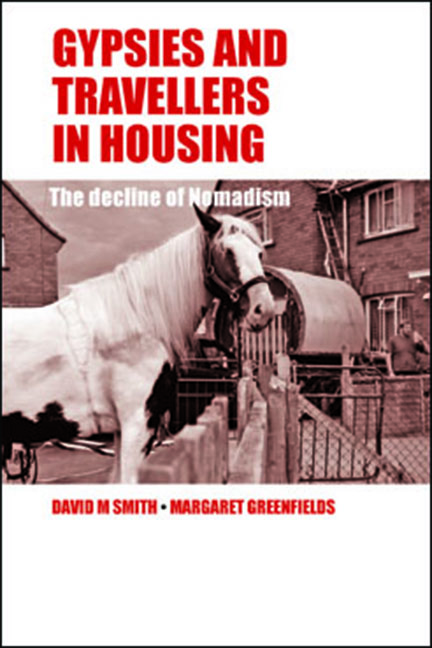Book contents
- Frontmatter
- Contents
- List of tables
- Acknowledgements
- Foreword
- one Introduction
- two Space, surveillance and modernity
- three Gypsies, nomads and urbanisation: a social history
- four The research sites and population sample
- five Routes into housing
- six Housing transitions
- seven Gypsies, Travellers and gorjers: conflict and cooperation
- eight Recreating community
- nine Young people in housing: aspirations, social relations and identity
- ten Conclusion
- Appendix A Methodologies
- Appendix B Glossary of words and terms
- References
- Index
eight - Recreating community
Published online by Cambridge University Press: 03 February 2022
- Frontmatter
- Contents
- List of tables
- Acknowledgements
- Foreword
- one Introduction
- two Space, surveillance and modernity
- three Gypsies, nomads and urbanisation: a social history
- four The research sites and population sample
- five Routes into housing
- six Housing transitions
- seven Gypsies, Travellers and gorjers: conflict and cooperation
- eight Recreating community
- nine Young people in housing: aspirations, social relations and identity
- ten Conclusion
- Appendix A Methodologies
- Appendix B Glossary of words and terms
- References
- Index
Summary
As explored in the previous chapter, social relations between housed Gypsies and Travellers and their sedentary neighbours are not infrequently characterised by tensions, and the use of (mutual) negative stereotyping which can sporadically flare into open conflict. As a response both to the potentially hostile environment in which some housed Gypsies and Travellers find themselves and as a mechanism for preserving and asserting their own cultural identity, specific strategies are utilised. Holloway (2005) examines how white rural residents in the vicinity of Appleby horse fair construct and racialise Gypsies and Travellers, which subsequently shapes how they relate towards them. She argues that general attitudes towards these groups, as well as discursive constructions of differences within the travelling population (between ‘true’ Gypsies and ‘hangers on’), are based on certain physical and cultural markers. In contrast to ‘passing’, whereby individuals from stigmatised groups attempt to pass as members of ‘mainstream’ society, one strategy involved the accentuation of these physical and cultural markers and adoption of an overtly ‘Traveller’ identity demonstrating the range and adaptability of collective strategies which may be employed depending on the specific situational context. Strategies may involve avoidance of contact with individuals from other communities or use of Romanes or Gammon/Cant as an exclusionary tactic. Matras (2010, p 169) notes that the use of Romani vocabulary among British Travellers is a result of ‘insiders insisting on the maintenance of a group-particular form of speech, coupled with the functionality of an in-group lexicon in the social context of a tight knit peripatetic group’.
Other tactics include the manipulation of stereotypes for personal advantage such as cultivation of an aggressive and violent demeanour or the feigning of illiteracy, all of which may feature within an armoury of techniques utilised by informants. The maintenance of cultural boundaries and retention of distinctive minority identities through distinctive strategies are common to a number of diasporic communities (Song, 2003; Hewstone et al, 2007). Conversely, as considered in the following chapter the cultural markers which signify membership of the Gypsy or Traveller community can, in certain socio-spatial contexts, be seen as a desirable form of cultural capital by young people from a range of ethnic groups. Fernandez Kelly (1994) highlights the close relation between social and cultural capital: both are defined by physical factors like the characteristics of space and also by collective categories such as class, gender and ethnicity.
- Type
- Chapter
- Information
- Gypsies and Travellers in HousingThe Decline of Nomadism, pp. 155 - 174Publisher: Bristol University PressPrint publication year: 2013



